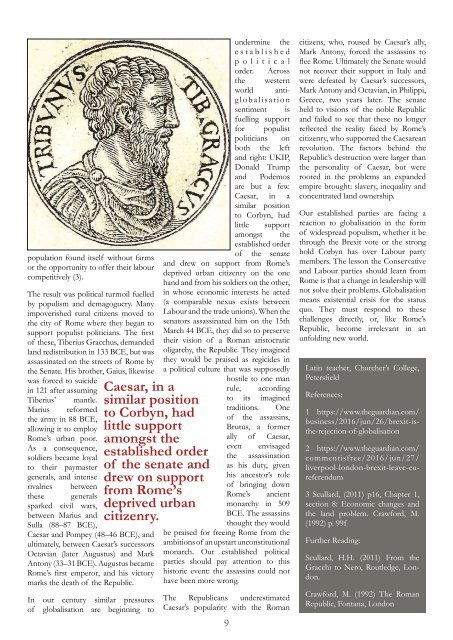Ink 2017
Ink is the School's academic magazine. Published annually, it is an outlet for both academic and creative writing, featuring contributions from Senior School students and members of staff.
Ink is the School's academic magazine. Published annually, it is an outlet for both academic and creative writing, featuring contributions from Senior School students and members of staff.
Create successful ePaper yourself
Turn your PDF publications into a flip-book with our unique Google optimized e-Paper software.
population found itself without farms<br />
or the opportunity to offer their labour<br />
competitively (3).<br />
The result was political turmoil fuelled<br />
by populism and demagoguery. Many<br />
impoverished rural citizens moved to<br />
the city of Rome where they began to<br />
support populist politicians. The first<br />
of these, Tiberius Gracchus, demanded<br />
land redistribution in 133 BCE, but was<br />
assassinated on the streets of Rome by<br />
the Senate. His brother, Gaius, likewise<br />
was forced to suicide<br />
in 121 after assuming<br />
Tiberius’ mantle.<br />
Marius reformed<br />
the army in 88 BCE,<br />
allowing it to employ<br />
Rome’s urban poor.<br />
As a consequence,<br />
soldiers became loyal<br />
to their paymaster<br />
generals, and intense<br />
rivalries between<br />
these generals<br />
sparked civil wars,<br />
between Marius and<br />
Sulla (88–87 BCE),<br />
Caesar and Pompey (48–46 BCE), and<br />
ultimately, between Caesar’s successors<br />
Octavian (later Augustus) and Mark<br />
Antony (33–31 BCE). Augustus became<br />
Rome’s first emperor, and his victory<br />
marks the death of the Republic.<br />
In our century similar pressures<br />
of globalisation are beginning to<br />
Caesar, in a<br />
similar position<br />
to Corbyn, had<br />
little support<br />
amongst the<br />
established order<br />
of the senate and<br />
drew on support<br />
from Rome’s<br />
deprived urban<br />
citizenry.<br />
undermine the<br />
established<br />
political<br />
order. Across<br />
the western<br />
world antiglobalisation<br />
sentiment is<br />
fuelling support<br />
for populist<br />
politicians on<br />
both the left<br />
and right: UKIP,<br />
Donald Trump<br />
and Podemos<br />
are but a few.<br />
Caesar, in a<br />
similar position<br />
to Corbyn, had<br />
little support<br />
amongst the<br />
established order<br />
of the senate<br />
and drew on support from Rome’s<br />
deprived urban citizenry on the one<br />
hand and from his soldiers on the other,<br />
in whose economic interests he acted<br />
(a comparable nexus exists between<br />
Labour and the trade unions). When the<br />
senators assassinated him on the 15th<br />
March 44 BCE, they did so to preserve<br />
their vision of a Roman aristocratic<br />
oligarchy, the Republic. They imagined<br />
they would be praised as regicides in<br />
a political culture that was supposedly<br />
hostile to one man<br />
rule, according<br />
to its imagined<br />
traditions. One<br />
of the assassins,<br />
Brutus, a former<br />
ally of Caesar,<br />
even envisaged<br />
the assassination<br />
as his duty, given<br />
his ancestor’s role<br />
of bringing down<br />
Rome’s ancient<br />
monarchy in 509<br />
BCE. The assassins<br />
thought they would<br />
be praised for freeing Rome from the<br />
ambitions of an upstart unconstitutional<br />
monarch. Our established political<br />
parties should pay attention to this<br />
historic event: the assassins could not<br />
have been more wrong.<br />
The Republicans underestimated<br />
Caesar’s popularity with the Roman<br />
9<br />
citizens, who, roused by Caesar’s ally,<br />
Mark Antony, forced the assassins to<br />
flee Rome. Ultimately the Senate would<br />
not recover their support in Italy and<br />
were defeated by Caesar’s successors,<br />
Mark Antony and Octavian, in Philippi,<br />
Greece, two years later. The senate<br />
held to visions of the noble Republic<br />
and failed to see that these no longer<br />
reflected the reality faced by Rome’s<br />
citizenry, who supported the Caesarean<br />
revolution. The factors behind the<br />
Republic’s destruction were larger than<br />
the personality of Caesar, but were<br />
rooted in the problems an expanded<br />
empire brought: slavery, inequality and<br />
concentrated land ownership.<br />
Our established parties are facing a<br />
reaction to globalisation in the form<br />
of widespread populism, whether it be<br />
through the Brexit vote or the strong<br />
hold Corbyn has over Labour party<br />
members. The lesson the Conservative<br />
and Labour parties should learn from<br />
Rome is that a change in leadership will<br />
not solve their problems. Globalisation<br />
means existential crisis for the status<br />
quo. They must respond to these<br />
challenges directly, or, like Rome’s<br />
Republic, become irrelevant in an<br />
unfolding new world.<br />
Latin teacher, Churcher’s College,<br />
Petersfield<br />
References:<br />
1 https://www.theguardian.com/<br />
business/2016/jun/26/brexit-isthe-rejection-of-globalisation<br />
2 https://www.theguardian.com/<br />
commentisfree/2016/jun/27/<br />
liverpool-london-brexit-leave-eureferendum<br />
3 Scullard, (2011) p16, Chapter 1,<br />
section 8: Economic changes and<br />
the land problem. Crawford, M.<br />
(1992) p. 99f<br />
Further Reading:<br />
Scullard, H.H. (2011) From the<br />
Gracchi to Nero, Routledge, London.<br />
Crawford, M. (1992) The Roman<br />
Republic, Fontana, London







